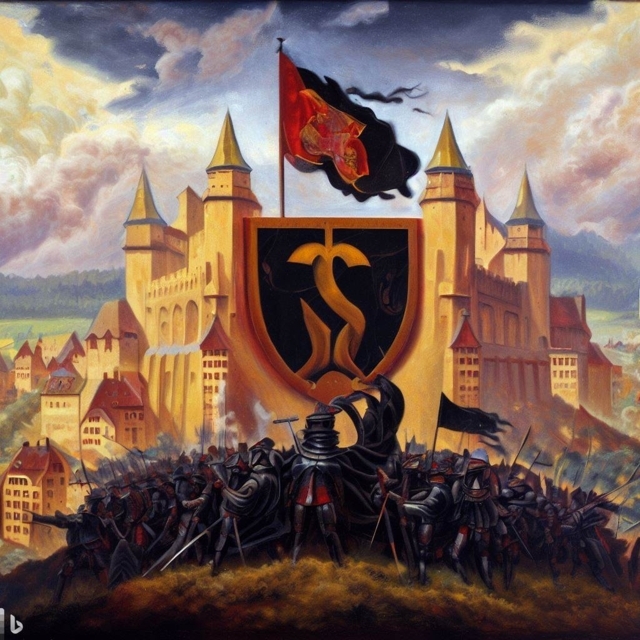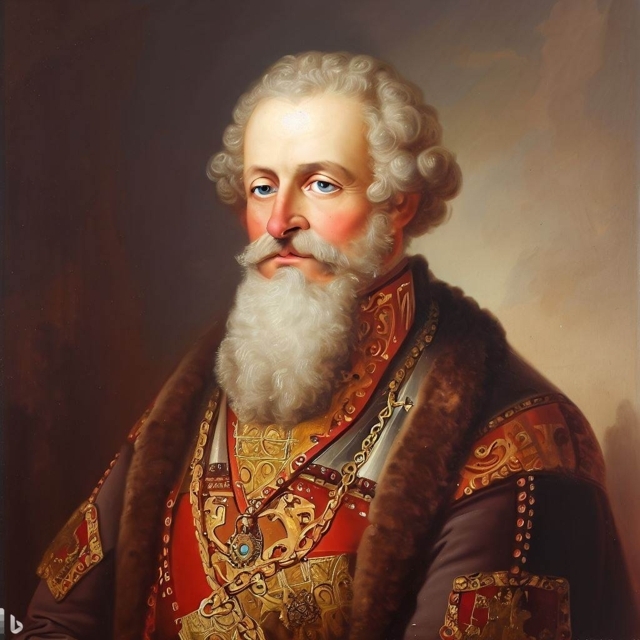A Small Principality’s Struggle for Independence.
The history of Germany is filled with numerous small principalities that played crucial roles in shaping the country’s political landscape. One such principality was Schwarzburg-Rudolstadt, which existed from 1599 until 1867 when it became part of Prussia. This tiny state managed to maintain its independence despite being surrounded by more powerful neighbours and its historical significance during this period.
Establishment of Schwarzburg-Rudolstadt (1599)
In 1599, Count Gunther von Schwarzburg founded the County of Schwarzburg-Rudolstadt after his marriage to Anna Sophie of Brunswick-Wolfenbüttel. The new county comprised several territories scattered across Thuringia, including the towns of Rudolstadt, Heiningen, Leutenberg, and Stadtilm. These territories were previously ruled by different branches of the House of Schwarzburg since the 11th century. However, due to various conflicts within the family, these territories were divided into smaller units until they eventually merged under Count Gunther von Schwarzburg.
Capital Move to Rudolstadt (c. 1340)
One significant event that contributed to the stability of the newly formed county was the decision to move the capital from Schwarzburg Castle to Rudolstadt around 1340. This strategic move allowed the ruling counts to control both military and economic activities within their territory. By establishing themselves in Rudolstadt, the counts could ensure better protection against potential threats posed by external forces seeking to expand their influence over the region.
Historical Role
Due to its location between Saxony and Bavaria, Schwarzburg-Rudolstadt often found itself caught between competing interests. Despite its size, the principality played an important role in regional politics throughout the centuries. During the Protestant Reformation, the counts supported Martin Luther’s teachings and converted the population to the new faith. As a result, Schwarzburg-Rudolstadt remained relatively stable compared to other German states during the Thirty Years War (1618-1648). Its neutrality ensured that neither side attacked or occupied the principality, allowing it to retain its autonomy.
Following the Peace of Westphalia (1648), Schwarzburg-Rudolstadt continued to play a minor yet influential role in regional affairs. It participated in various alliances and treaties aimed at promoting peace and stability among neighbouring states. For instance, the principality joined the League of Neutral Sworn Allies in 1714, which sought to prevent aggression towards smaller territories during the ongoing conflict between Austria and Prussia.
Principle of Primogeniture (1790)
Another significant development occurred in 1790 when the principle of primogeniture was introduced. Under this system, only the eldest son born in wedlock could inherit the throne upon the death of his father. While this rule may seem straightforward today, it represented a major shift in thinking at the time. Previously, all sons had equal rights to succeed their fathers regardless of whether they were legitimate or illegitimate children.
This change helped stabilise succession disputes within the House of Schwarzburg and reduced internal power struggles. With clear regulations governing inheritance, the counts focused more on managing their territories effectively rather than fighting over who would assume power next.
Achieving Full Sovereignty (1806)
In 1806, Schwarzburg-Rudolstadt achieved full sovereignty status through Napoleon Bonaparte’s mediatisation process. Mediatisation involved elevating certain imperial knightly families and secular principalities to the rank of monarchies while reducing others to mere countships. Although Schwarzburg-Rudolstadt did not receive the coveted title of kingship, it gained recognition as a fully sovereign state.
Revolutionary Period (1820-1821)
As elsewhere in Europe, the early 19th century brought social unrest to Schwarzburg-Rudolstadt. Between 1820 and 1821, local peasants revolted against their lords’ demand, the revolutionaries pressed for greater participation in governmental decisions affecting their daily lives. Eventually, the counts agreed to implement some reforms, but they also imposed strict penalties for any future uprisings.
Alliance with Prussia (1863)
By the mid-19th century, Schwarzburg-Rudolstadt faced increasing pressure from larger powers encircling it. In response, the principality entered into an offensive and defensive alliance with Prussia in 1863. This agreement aimed to protect each party from potential attacks by France or Austria without directly committing either partner to fight alongside the other.
Nevertheless, Prussian Chancellor Otto von Bismarck-Schoenfels secretly negotiated the Treaty of Prague (1866) with Austria, which nullified the alliance with Schwarzburg-Rudolstadt. When war broke out between Prussia and Austria later that year, the principality remained neutral, fearful of provoking either belligerent power.
Subsequent events led to the dissolution of the Confederation of German States and the creation of the North German Confederation in 1867 dominated by Prussia. It became a member state of the German Empire in 1871.
Conclusion
Despite its modest size and limited resources, Schwarzburg-Rudolstadt successfully maintained its independence for nearly two centuries. Through astute diplomacy, strategic moves like the capital transfer to Rudolstadt, and implementing legal frameworks such as primogeniture, the counts navigated treacherous waters to preserve their realm. Their efforts enabled the principality to contribute significantly to regional politics during critical junctures in European history. Ultimately, Schwarzburg-Rudolstadt’s legacy serves as a testament to the resilience and adaptability of even the smallest entities in times of great uncertainty.
References:
– “Schwarzburch-Rudolstadt.” Wikipedia, https://en.wikipedia.org/wiki/Schwarzburg-Rudolstadt
– https://en.wikipedia.org/wiki/List_of_historical_states_of_Germany#Principalities
– “House of Schwarzburg.” Wikipedia, https://en.wikipedia.org/wiki/House_of_Schwarzburg
– “Thirty Years War.” Wikipedia, https://en.wikipedia.org/wiki/Thirty_Years_War
– “Peace of Westphalia.” Wikipedia, https://en.wikipedia.org/wiki/Peace_of_Westphalia
– “Mediatization.” Wikipedia, https://en.wikipedia.org/wiki/German_mediatisation
– “Otto von Bismarck-Schoenfels.” Wikipedia, https://en.wikipedia.org/wiki/Otto_von_Bismarck
– “Treaty of Prague.” Wikipedia, https://en.wikipedia.org/wiki/Peace_of_Prague_(1866)
Bibliography:
– “The New International Encyclopedia” Volume 5, Dodd Mead & Company, 1909.
– “History of Germany,” by James Bryce, The MacMillan Co., 1914.
Tags
Divi Meetup 2019, San Francisco
Related Articles
Unappreciated Greatness
Life and Legacy of Jahangir of the Mughal Empire. Jahangir ruled over one of the largest empires in human history during his lifetime, yet few people outside of South Asia have heard of him. I aim to shed light on the life and legacy of this remarkable figure,...
The Plague Doctor’s Diary
A Personal Account of the Turin Epidemic of 1656. I am writing this diary to record my experiences and observations as a plague doctor in Turin, the capital of the Duchy of Savoy, during the terrible epidemic that has afflicted this city and its surroundings since the...
The Timeless Beauty of Bustan
Unveiling the Secrets of Saadi Shirazi's Masterpiece.In the realm of Persian literature, few works have captured the essence of love, spirituality, and morality quite like Bustan (The Orchard) by Saadi Shirazi. This 13th-century masterpiece has left a lasting impact...
Stay Up to Date With The Latest News & Updates
Explore
Browse your topics of interest using our keyword list.
Join Our Newsletter
Sign-up to get an overview of our recent articles handpicked by our editors.
Follow Us
Follow our social media accounts to get instant notifications about our newly published articles.










